15th Jun 2022
Your Top Thyroid Questions Answered: Q&A with Dr. Lisa Hunt of Holtorf Medical Group
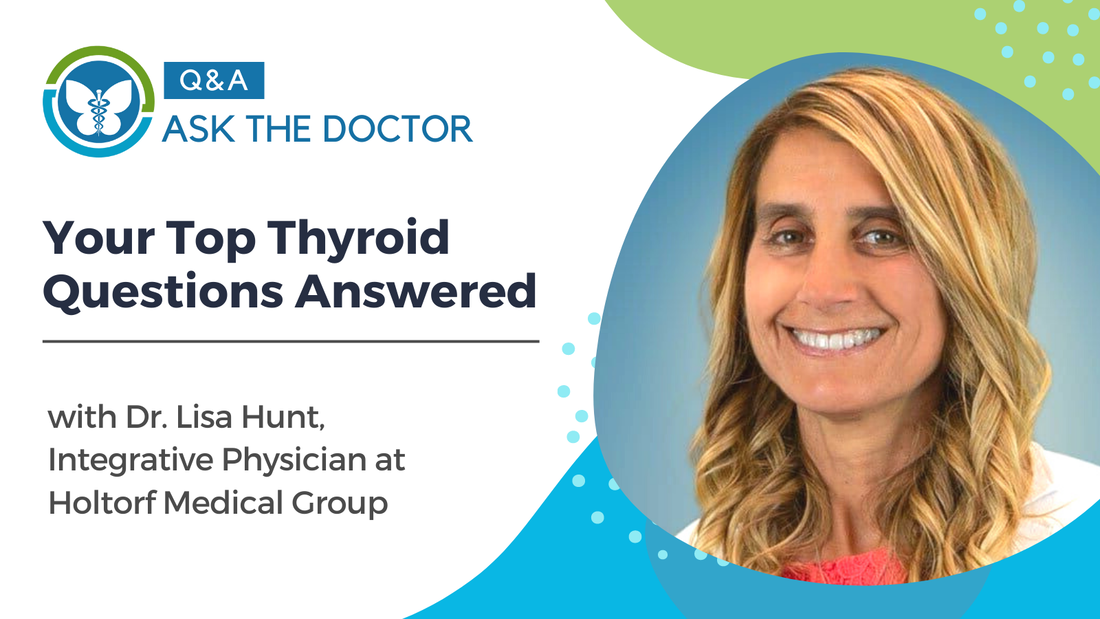
What You'll Learn:
- Thyroid labs your doctor should order and their optimal ranges
- How to diagnose and treat high Reverse T3 issues
- Forms of thyroid medication and how they are different
- Dietary recommendations for thyroid patients
- How to determine if thyroid medication needs a dose adjustment
- What patients can do to support their thyroid health
I had the pleasure of speaking with Lisa Hunt, D.O., an integrative physician at Holtorf Medical Group (www.holtorfmed.com) in El Segundo, CA a short while ago. I polled my audience and your top thyroid-related questions are answered here by Dr. Hunt. Dr. Hunt is a board-certified integrative physician and has extensive experience in thyroid health, hormone replacement, immune dysfunction and chronic conditions.
A lot of people don’t spend much time thinking about whether their thyroid gland is functioning sufficiently, but having your thyroid hormones at optimal levels plays a key role in how your body regulates metabolism, growth and development, mood, and sleep. In fact, every cell in your body needs thyroid hormone to perform well.
That said, many thyroid patients report that it has taken years to get a diagnosis, or they struggle to find adequate care to manage their condition.
Simply put, thyroid patients are in desperate need to find doctors who test with a full thyroid panel, know optimal ranges for best results, provide individualized treatment options, and listen to symptoms with lab testing as a guide.
______
About My Guest: Dr. Lisa Hunt, D.O.
With my mission to help thyroid patients learn more about their condition and to help them find excellent care, I was fortunate to interview thyroid and hormone expert Lisa Hunt, D.O., of Holtorf Medical Group.
Dr. Hunt specializes in anti-aging treatment, thyroid hormone replacement, menopause/andropause therapy (including bioidentical hormone replacement), chronic fatigue syndrome, fibromyalgia, Lyme disease, strengthening the immune system, neurotransmitter analysis/replacement, and nutritional support guidance.
Dr. Hunt is board certified in both Family Medicine and Holistic and Integrative Medicine, and she brings over 20 years of experience as both a family physician and medical director. Her approach to treating thyroid disease is based on her decades of experience, open mind and experience with a variety of unique thyroid cases, and listening to patient concerns.
In this recent interview, Dr. Hunt answers my audience’s most pressing questions, and shares her approach on thyroid disease and how she has helped patients in her practice.
______
1. What thyroid labs do you order, and what do you consider optimal ranges?
[Dr. Hunt]: When testing thyroid function, many doctors only test the levels of Thyroid-Stimulating Hormone (TSH). Although TSH is considered the “gold standard” test by many endocrinologists, there is no consensus on the appropriate reference range for this test.
Some endocrinologists consider any number within the reference range (it’s around .40 to 4.0 mlU/L at many U.S. labs) “normal,” and others feel that TSH must be as high as 10 mlU/L.
Therefore, the TSH test is not only unreliable due to the lack of consensus as to what the results indicate, but also because TSH is a limited analysis of thyroid function.
More specifically, this “gold standard” test neither considers Free T4 and Free T3 — the actual circulating thyroid hormones, nor the antibodies that detect autoimmune thyroid disease (such as Hashimoto’s thyroiditis).
As a result, you may have sub-normal levels of T4 and T3 (meaning, bodily systems are not receiving enough thyroid hormone), and/or antibodies that show that your thyroid gland is in self-destruct mode. Yet, if your TSH is within the reference range, the endocrinologist may say your thyroid function is “normal.”
Moreover, it is more uncommon for endocrinologists to screen for a patient’s levels of Reverse T3 (RT3). As the mirror image of T3, RT3 is responsible for keeping active thyroid hormone levels balanced and is important for overall thyroid function.
Additionally, stress, diet, inflammation, and/or chronic illness can negatively impact the conversion of the T4 thyroid hormone into T3, which can result in severe symptoms of hypothyroidism that would not be detected by a TSH test.
Thus, in order to receive an accurate picture of your thyroid health, it is best to have a full panel screening of your thyroid hormones.
I typically test the following labs in a patient’s thyroid panel while taking careful consideration into symptoms and what levels may be optimal for the individual:
- TSH (Thyroid Stimulating Hormone): This test measures the hormone that is released by the pituitary gland in the brain to signal the thyroid gland in the neck to make thyroid hormones. An elevation in TSH may be one indicator of decreased thyroid activity. However, TSH is not the only picture of the thyroid puzzle. Optimal Level: TSH levels above 2.5 are considered to be suspicious for subclinical hypothyroidism.
- Free T4 (Free Thyroxine): This test measures the “storage” thyroid hormone of T4 (produced by the thyroid gland) that needs to be converted to the more “active” T3 hormone. It is high with hyperthyroidism and low with hypothyroidism. Optimal Level: While the reference range at many labs runs from .8 to 2.8 ng/dL, many integrative physicians have found that most patients feel best when their level falls into the top half of the range, at a level of 1.3 or higher.
- Free T3 (Free Triiodothyronine): This test measures free T3 hormone and is the best marker for measuring “active” thyroid hormones available to thyroid receptor sites. Decreased FT3 levels are one indicator of low thyroid activity. Optimal Level: While the reference range at many labs runs from 2.3 to 4.2 pg/mL, integrative physicians have found that most patients feel best when their level falls into the top half of the range, at a level of 3.2 or higher, and in many cases, at 3.7 or higher.
- Reverse T3 (Reverse Triiodothyronine): This test measures the amount of T4 that is converted into a biologically “inactive” or “reverse” form of the T3 hormone. Elevated levels of RT3 may suggest that thyroid hormone is not properly converted from T4 into T3 (for use by the cells) and may result in hypothyroidism symptoms despite otherwise “normal” levels of Free T4, Free T3, and/or TSH. Optimal Level: Many integrative physicians feel that a Reverse T3 greater than 15 may suggest a conversion issue. However, the RT3/FT3 ratio is also important. Optimal ratio results should be greater than .20 if you divide the FT3 by the RT3 results using pg/mL and ng/dL units.
- Thyroid Antibodies (including TgAb, TPO Ab, TSIG, and TBG): These labs test for increased levels of specific antibodies to thyroid proteins. The Hashimoto’s “red flag” antibodies to check are anti-thyroid peroxidase (TPO) and thyroglobulin antibodies (TgAb). The “red flag” Graves’ disease antibodies to check are thyrotropin receptor antibody (TRAb) and thyroid stimulating immunoglobulin (TSI). Optimal Level: Ideally, these levels should be negative or below reference range.
______
2. What is high Reverse T3? How is it diagnosed and how do you treat it?
[Dr. Hunt]: If your labs show a high Reverse T3 level, you may be converting most of your T4 into Reverse T3. This is problematic due to the fact that RT3 will bind to T3 receptors, but it has no bioactivity. As a result, high RT3 levels can lead to hypothyroid symptoms, despite the other thyroid hormones being in the “normal range”.
Potential causes of high RT3 include chronic dieting/starvation, nutrient deficiencies, kidney disease, adrenal dysfunction, chronic infection, and stress.
Unfortunately, due to the previously described issue of the prevalence of TSH-only testing to diagnose thyroid health (ie. not a full thyroid panel), RT3 tests are not commonly ordered.
The blood test for RT3 is controversial because there is a lack of consensus on how to interpret the results or treat the patient. Fortunately, there is an increasing amount of interest among practitioners to understand and determine the role of RT3 in thyroid disease and severe medical illnesses.
In regard to treatment, one method of addressing high RT3 is to prescribe a sustained release of T3 for two to three months.
The goal is for the negative feedback to the pituitary gland from the sustained release T3 to slow down the production of T4, which can result in a decrease in the production of RT3. Symptoms will improve with lower levels of RT3 because T3 will be able to bind unopposed to receptors.
______
3. What forms of thyroid medication do you prefer and why?
[Dr. Hunt]: Despite popular belief, there is no one effective standard treatment for thyroid disease.
In fact, one of the most important things to understand as both a practitioner and as a patient is that each case is different and every person has individualized needs.
1.) Synthetic T4: Levothyroxine, Synthroid, and Levoxyl are some of the most common medications prescribed for hypothyroidism. Such synthetic forms of T4 are administered in hopes of normalizing patients’ thyroid hormone levels based on the assumption that the body will correctly convert T4 into T3.However, if T4 remains unconverted or is over-converted into Reverse T3, their health will not improve.
Therefore, despite its increasing popularity as a treatment method, synthetic T4-only medication may not be the best option.Multiple studies have shown that T4-only formulations are not effective for optimizing or resolving thyroid disease.More specifically, a 1995 study published in the Journal of Clinical Investigation found that reaching optimal levels of TSH and T4 using T4-only formulations did not provide necessary T3 tissue levels. This resulted in the pituitary gland exhibiting proper T4 and TSH levels, but nearly all other tissues were deficient.Moreover, this study showed that patients who converted T4 to RT3 experienced a worsening of their symptoms with the use of T4-only medications. As a result, medicating with the addition of T3 may produce better results.
2.) Synthetic T3: In contrast, T3 formulations such as Cytomel are underutilized methods of treating thyroid disease.
Patients suffering from RT3 issues and poor thyroid function can benefit greatly from preparations containing T3 in addition to T4 (even if they present with normal levels of T4 and TSH).
Providing the body with appropriate amounts of T3 can reduce the need for additional T4.
In regard to Cytomel (liothyronine sodium) specifically, it is a synthetic formulation of thyroid hormone and acts significantly quicker than Levothyroxine and other T4 medications because the T3 provided by Cytomel does not need to be converted, and it can quickly influence metabolic function throughout the body.
3.) Natural Desiccated Thyroid: Unlike synthetic formulations, Natural Desiccated Thyroid (NDT) drugs are a prescription hormone treatment derived from natural sources. These formulations are frequently derived from animals (such as the dried thyroid gland of pigs or cows).
In fact, in the United States, NDT is exclusively formulated from pigs. NDT is also known as natural thyroid, porcine thyroid, or thyroid extract. There are multiple brands of NDT including Nature-Throid, Thyroid WP, Armour, and Acella.Unfortunately, many doctors still do not see this medication option as a valid or promising method of treatment. However, many patients may greatly benefit from switching from synthetic forms of thyroid hormone to natural formulations.
That said, every case is individual.
Part of the reason NDT can be more effective for some individuals is because it closely resembles human thyroid hormones, making it easier for the body to process.
Additionally, NDT is highly customizable allowing for unique formulations of T4, T3, T2, T1 and other thyroid hormones and nutrients to be easily incorporated into the same treatment.
It is also important to note that NDT is regulated by the FDA and undergoes a rigorous quality assurance testing.
4.) Compounded Medications: As far as compounded medications, many patients benefit from a combination of T4 and T3 compounded formulations. This is in part due to the fact that a quality compound eliminates the potential of including thyroid-inhibiting substances such as lactose and gluten, which are common in many medications.
Moreover, compounded medications give physicians the ability to customize the levels of T3 and T4 contained in their prescribed medication (because they are tailor-made). As a result, patients can require the specific quantities of hormones needed for their unique situation.
It is worth noting that patients who have not done well using T4-only formulations or NDT frequently benefit from a specified compound treatment.Given the variety and complexity of both thyroid health and thyroid medication, it is best to work with a trusted doctor to figure out your individual needs as every case is unique.
______
4. Do you have dietary recommendations for thyroid patients?
[Dr. Hunt]: Certain foods and drinks can negatively impact the thyroid. Below is a general outline of what we advise our patients:
Beneficial Food and Beverages
- Eggs: Eggs are an excellent source of iodine and selenium, which are critical building blocks for thyroid hormones. Eating one large egg fulfills 16 percent of the daily requirement for iodine and 20 percent for selenium. Of course, if you have an egg sensitivity, please limit or avoid the consumption of eggs.
- High Fiber Foods: Many thyroid patients struggle with constipation and extra weight. One of the key tactics that can help is increasing fiber intake, particularly from foods. However, if you switch to a high-fiber diet, you should get your thyroid rechecked in eight to twelve weeks to see if you need a dosage readjustment, as fiber can affect the absorption of medication.
- Coconut Oil: Coconut oil can raise basal body temperatures while increasing metabolism. This is good news for people who suffer from low thyroid function. This saturated, healthy fat is a thyroid-friendly option to replace other fats and oils in your diet.
- Water: One of the most powerful things thyroid patients can do to help their health and metabolism is to stay hydrated. Water helps your metabolism function more efficiently and can help reduce your appetite, get rid of water retention and bloating, improve your digestion and elimination, and combat constipation. Some experts even say that we should drink one ounce of water per pound of scale weight.
Take Caution With These Foods and Beverages
- Goitrogens: Goitrogens are substances that occur naturally in certain foods, drugs, and certain chemicals that can cause the thyroid gland to enlarge, which is called a goiter. Goitrogenic foods in massive amounts can also function like an anti-thyroid drug and can actually slow down the thyroid and make it underactive. The main goitrogenic foods are cruciferous vegetables like broccoli, cauliflower, kale, and cabbage, among others, as well as soy-based food.
- Coffee: It is recommended not to drink coffee until an hour after you have taken the thyroid hormone replacement medication. Otherwise, the coffee can affect absorption, and make your thyroid medication less effective.
- Celiac, Gluten, and Wheat: A subset of autoimmune thyroid patients have dietary-triggered autoimmunity, due to celiac disease, or a wheat/gluten intolerance. For these patients, going on a gluten-free diet may eliminate antibodies, and cause the remission of their autoimmune thyroid disease.
- Alcohol: Wine, beer, and liquor contain phytoestrogens, which increase estrogen levels in the body. Elevated estrogen levels or estrogen dominance suppresses thyroid hormone production.
______
5. What do you look at to determine if thyroid medication needs dose adjusting?
[Dr. Hunt]: Once you and your doctor feel that your thyroid hormones are near-optimal, is advisable to have a full thyroid panel performed every 6-12 months to see if your medication needs to be adjusted.
In the meantime, if you are still experiencing symptoms of hypothyroidism or general thyroid dysfunction, it may be due to ongoing fluctuations in thyroid hormone levels. This is a sign your medication dosage needs to be adjusted and you should have testing done every 6-8 weeks until optimal.It is important to note that certain factors may skew your thyroid test results, meaning the test may not indicate a true change in your condition. Being aware of factors that can influence your results can help you get the most accurate results as possible:
- Fasting: Consuming food and coffee has a tendency to impact your thyroid lab values. Overnight fasting the night before a morning test may show more accurate TSH levels. Subclinical hypothyroidism may be missed if you get your thyroid labs done in the afternoon and you have not been fasting. We recommend getting your thyroid labs drawn first thing in the morning and fasting every time.
- Lifestyle Factors: Stress, sleep deprivation, dieting, and different times of your menstrual cycle can influence the results, but it is unclear exactly how. It is best to get your thyroid tested under the same conditions every time.
- Medications/Supplements: Some medications and supplements can alter thyroid hormone function and test results including: lithobid, pacer one, iodine, kelp supplements, biotin, immuno-modulating drugs (such as interferon alpha and interleukin-2), chemotherapy drugs, tyrosine kinase inhibitors and (Nexavar and Sutent).
- Illness: Certain illnesses can affect thyroid hormone results (temporarily). For example, diarrhea can interfere with your medication absorption and may alter your lab results. Infections and inflammatory conditions such as lupus may also skew results.
______
6. What else can patients do to support their thyroid and to maximize their health?
[Dr. Hunt]: While the most common causes of thyroid problems are autoimmune conditions, there are steps you can take to support your thyroid and its various functions. Below are general tips that can help patients resolve their symptoms.
- Make sure you are getting enough iron, zinc, selenium, vitamin E, B vitamins, and iodine as low levels of these nutrients can potentially lead to thyroid issues. Look for a quality thyroid supplement with these key nutrients. (Note: Be particularly careful with your intake of iodine as high levels of iodine can also result in thyroid dysfunction).
- Find ways to properly manage your stress as high stress levels result in the release of cortisol, the stress hormone, which can then lead to adrenal fatigue and suppress the release of thyroid hormones.
- Avoid fluoride toxins as fluoride disrupts thyroid hormones and can impact the overall function of the thyroid.
- Avoid heavy metal toxins because they have been linked to thyroid disease and thyroid cancer.because they have been linked to thyroid disease and thyroid cancer.
- Eat a thyroid-supporting diet (avoid caffeine, alcohol, gluten, and any known food sensitivities).
______
7. What do you think needs to change in thyroid healthcare within general medicine?
[Dr. Hunt]: One of the main issues in thyroid healthcare is the “gold standard” of the TSH test.
The TSH test has proven itself inaccurate, and subsequent treatment (or lack thereof) based on this single test is ineffective.
A full thyroid panel should be the standard for the baseline test of thyroid health for anyone exhibiting symptoms. The thyroid is a complex organ and every case is unique, making a full panel completely essential for proper treatment.
In regard to healthcare in general, I am a strong believer in treating the whole-person, mind, and body, for optimal results.
Everything in the body is connected. With most general medicine, organs and bodily systems are treated separately as if they operate as stand-alone systems. This often leads to suboptimal results, and patients who are still symptomatic.
Because the thyroid is involved with so many body functions, and because countless people of the general population are suffering from an unresolved thyroid condition, thyroid disease is the best case example of how a lack of integrative, holistic treatment can be problematic.
______
In the video below, Dr. Hunt shares how her office utilizes in-depth testing for thyroid imbalances. If you would like more information about Dr. Lisa Hunt or Holtorf Medical Group, please visit their website. Their office is currently accepting new patients. They also provide regular phone/video appointments, depending on where you are located, for the convenience of out-of-town patients with one in-person appointment per year.
About My Guest
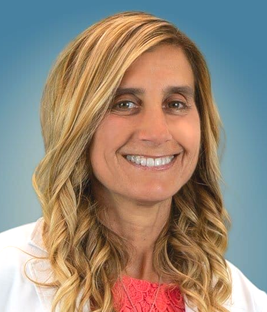
Lisa Hunt, D.O. is a functional medicine practitioner at Holtorf Medical Group in El Segundo, California. She is board certified in both Family Medicine and Holistic and Integrative Medicine, and she brings over 20 years of experience as a family physician and medical director. She specializes in anti-aging treatment, thyroid hormone replacement, menopause/andropause therapy (including bioidentical hormone replacement), chronic fatigue syndrome, fibromyalgia, neurotransmitter analysis/replacement, Lyme disease, immune system strengthening, and nutritional guidance.
SIMILAR ARTICLES
More like this...
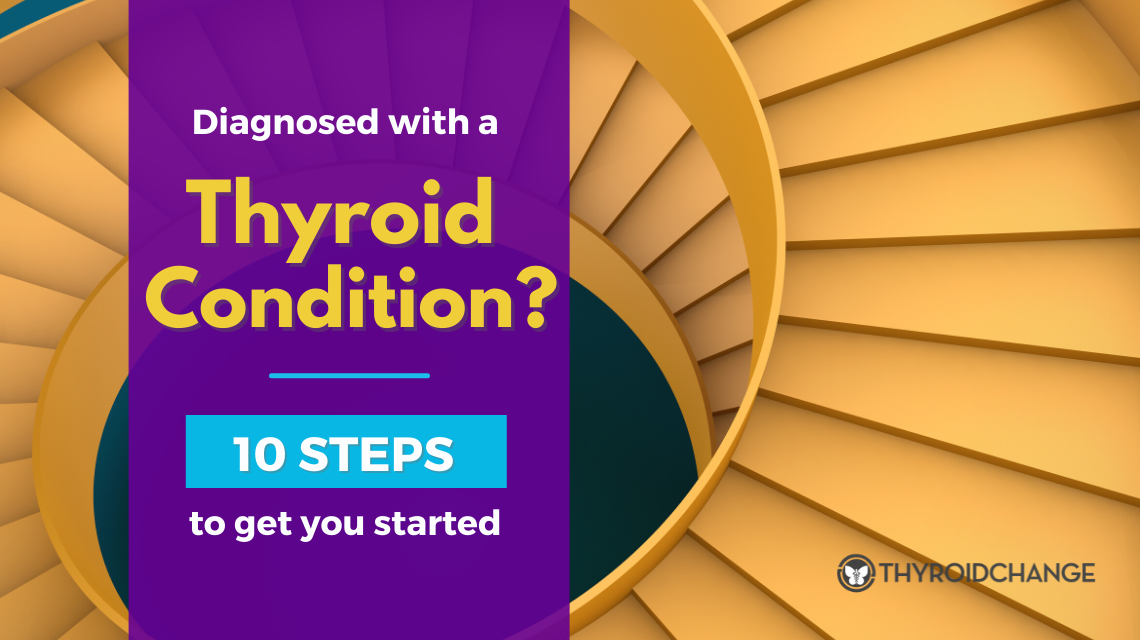
15th Jun 2022
Diagnosed With a Thyroid Condition? 10 Steps to Get You Started
Pursuing proper treatment and an overall healthy lifestyle that includes eating well and exercising can help you manage a thyroid condition. But what else can you do to live well with and thrive with your condition? The information can be overwhelming and Annabel Bateman, thyroid health advocate and author, has created this guide to walk you through essential lifestyle tips once you have been diagnosed.
Read Article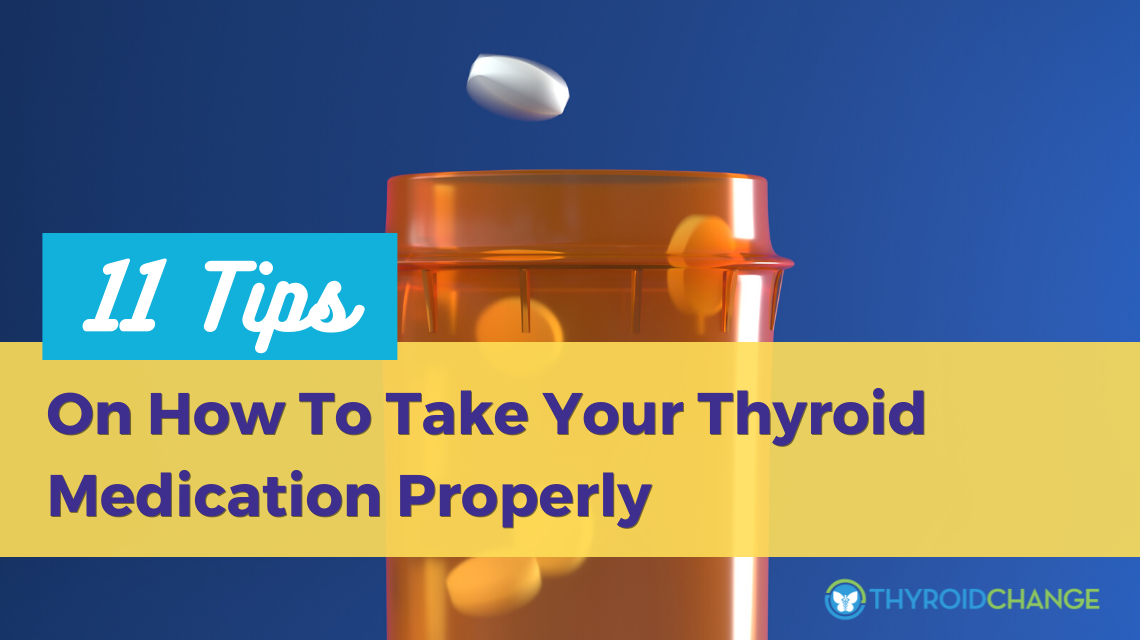
15th Jun 2022
11 Tips On How To Take Your Thyroid Medication Properly
Are you taking your thyroid hormone replacement medication correctly? Did you know that how and when you take your thyroid medication can affect your ability to absorb the necessary hormone properly? In the article below, I investigate the factors that contribute to correctly (or incorrectly) taking thyroid replacement hormone and on how thyroid patients can get the most out of their medication.
Read Article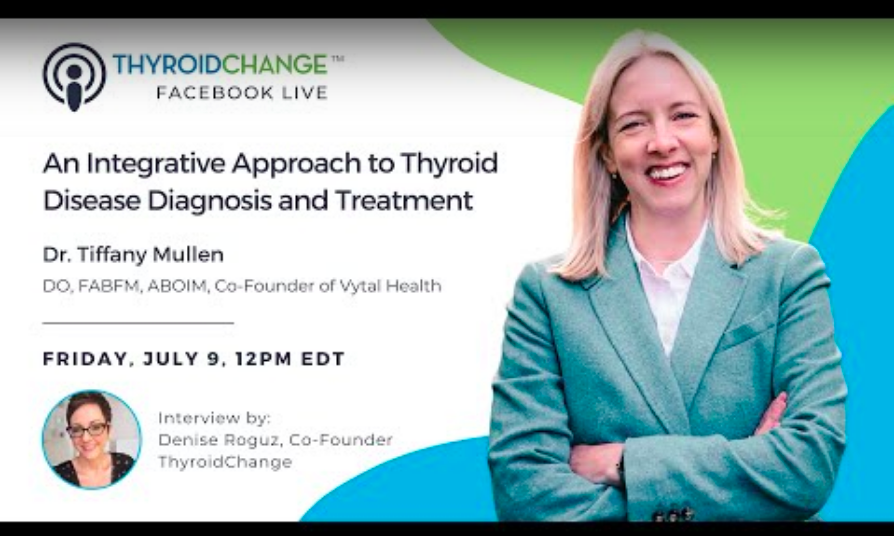
15th Jun 2022
Why Is Integrative Thyroid Care Essential? Q&A with Dr. Tiffany Mullen of Vytal Health
Tune in and listen to Denise Roguz of ThyroidChange interview integrative practitioner and hormone expert, Dr. Tiffany Mullen, DO, FABFM, ABOIM, and Co-Founder of integrative telemedicine company, Vytal Health (www.vytalhealth.com). You will learn why functional medicine is essential for many thyroid patients and how can it make a difference for you. The audience’s pressing thyroid questions are answered by Dr. Mullen at the end of the talk. What would you like to know?
Read Article